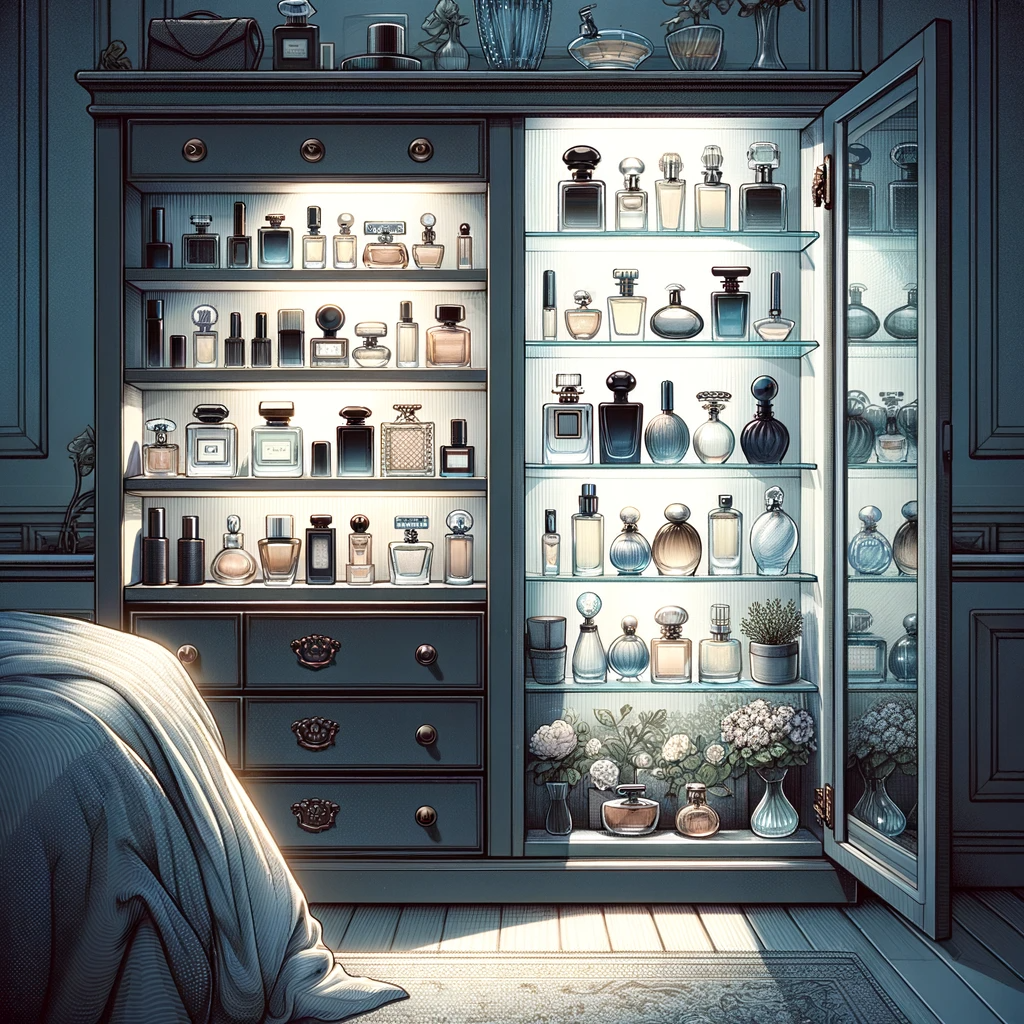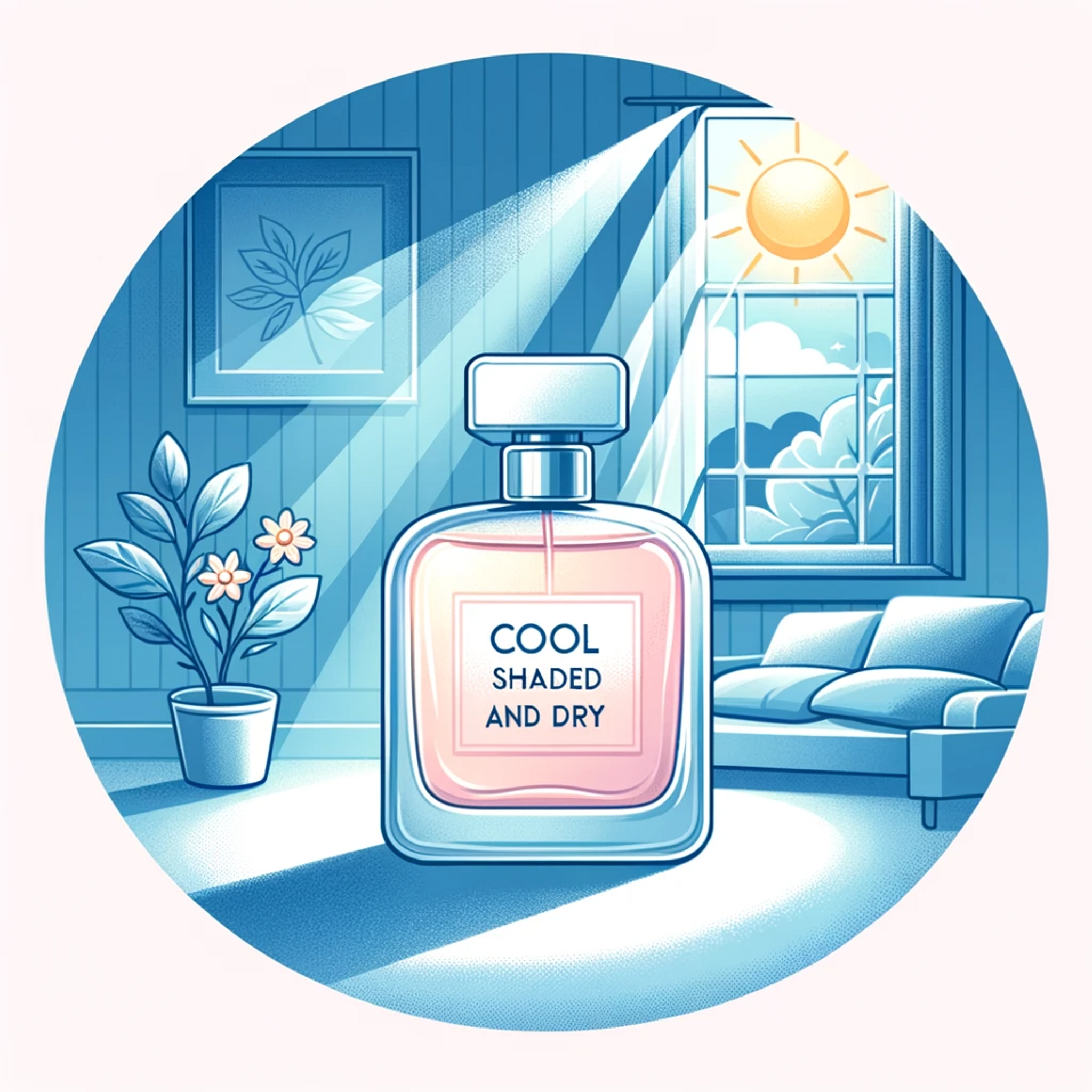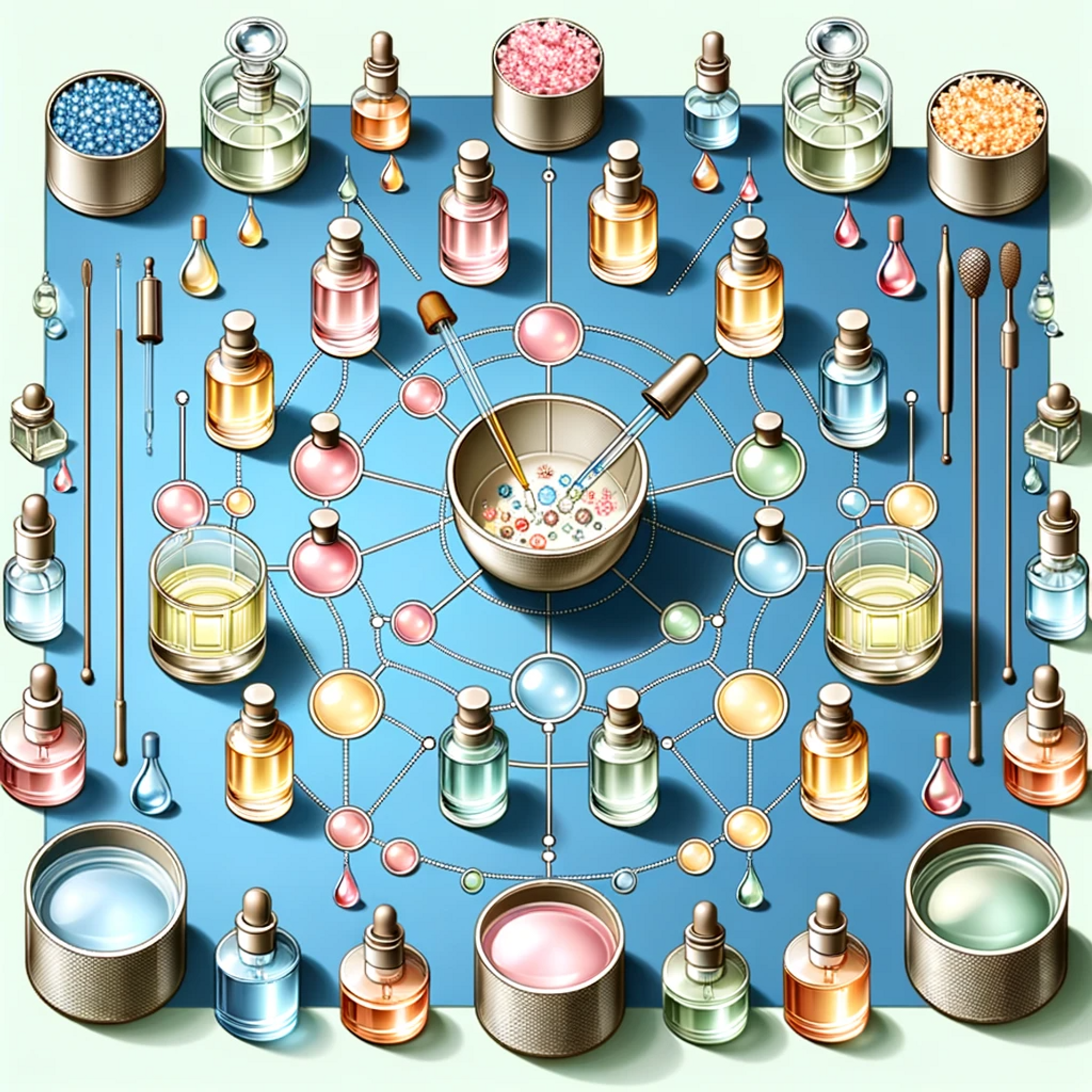
How to Store Perfume to Maximize Longevity
Don't miss out expert tips on how to store perfume appropriately to achive wanted intensity and silage.
Have you ever noticed that perfume has lost its power to project well lately? Or you got a brand new perfume but only a couple of months later it turns out that the perfume has gone bad?
A simple shift in temperature, exposure to light or air - and poof! That beloved fragrance is gone forever.
But how to store perfumes appropriately to make them last longer?
Many factors may affect overall perfume performance. The composition of the perfume notes, the ratio of fragrance (Eau de Cologne, Eau de Parfum, Eau de Toilette, or Extrait), weather conditions, oxygen, fragrance oil quality, how your skin will react to the scent…
Yeah, there are a lot of things to think about on how to store perfume the right way. It becomes a more complex story because you do not have any influence on some of the longevity factors.
How we store fragrances will affect the final perfume experience; it depends on you.
Storing perfume the right way is an ultimate factor to extend fragrance longevity and it is completely in our hands!
Chez Pierre, your trusted perfume guide, with more than 30 years in the perfume industry, offers verified information about simple hacks to store your perfumes that will tremendously maximize perfume longevity and increase perfume lifespan!
The Best Ways to Store Perfume
Storing perfume correctly is crucial for maintaining its essence and prolonging its life. Whether you're a collector with a vast array of fragrances or someone who cherishes a few select scents, understanding these principles will ensure your perfumes retain their captivating aromas for as long as possible.
1. Keep Your Perfume Bottle Cool
Perfumes thrive best under constant temperature conditions. Why so?
Let's think about how we feel when our body experiences temperature fluctuations discomfort kicks in right away. The same applies to perfumes. They're sensitive mixtures that respond poorly to changing environments.
Avoid storing fragrances near heaters or windows where they might experience heat fluctuations during the day. It may lead to a bad-smelling perfume experience.
Such spots can break down their chemical bonds leading to unwanted alterations in scent profile and color change. Fragrances provide more insights into this phenomenon if you're curious.

Store perfume on cool and dark place
2. Avoid Direct Sunlight
Did you know that exposure to light can break the chemical structure of the perfume and alter the scent? Yes, even your decorative perfume bottles are not immune.
Perfumes contain natural ingredients and rare elements sensitive to light. Exposure to sun rays will lead to unwanted chemical reactions and perfume color change may occur.
Let me draw an analogy here - consider your high-quality perfume like a vampire. Just as vampires avoid sunlight due to its damaging effects, perfumes need protection from direct sunlight too.
Direct sunlight speeds up degradation processes affecting both scent longevity and quality significantly - yet another reason why dark places make ideal storage for bottles of precious essences.
3. Dry Air and No Ventilation
Keeping perfumes stored where it’s humid or hot – yes, we’re looking at your bathroom counters. Did you know storing perfume in such spaces could ruin the scent due to humidity from showers or baths?
The perfume life starts when you unbox your perfume and use it for the first time. As soon as the box is opened, the countdown begins and degradation progresses. How fast this happens depends largely on storage conditions. Air exposure may oxidize delicate ingredients causing unwanted scent changes.
4. Good Areas for Storing Perfume
The location to store your perfumes can make a considerable difference in preserving their quality. Areas like the bedroom, closet, or dresser drawer offer a stable environment, typically away from fluctuating temperatures and direct sunlight.
Interestingly, the kitchen cabinet or even the refrigerator can be considered for storage, especially for oil-based perfumes or those with natural ingredients. However, it's important to ensure that these places are not exposed to extreme cold or heat, which could affect the scent notes.
Here are some suggestions for where you should store perfume:
- Bedroom: A classic choice, as bedrooms are usually cool and dark, providing an ideal setting for your perfume collection.
- Closet: Keep your fragrances in your closet to shield them from direct sunlight while ensuring they're readily accessible.
- Dresser Drawer: A convenient and dark spot that maintains a consistent temperature, perfect for preserving the integrity of your perfumes.
- Kitchen Cabinet: Surprisingly, the kitchen can be an excellent option if it meets the criteria of cool, dark, and dry storage.
- Refrigerator: For those with a vast collection, storing perfumes in the refrigerator can significantly slow down the aging process.

Places where you may store perfumes
5. Perfume Shelf Storage
Consider investing in a designated perfume shelf or a special air-tight container to keep your collection organized and shielded from external elements.
The original perfume packaging, including the perfume cap and package, serves as a protective barrier, ensuring your fragrances stay fresh for longer. If you have a substantial collection, a large chest can be a stylish and practical solution to house all your precious scents.
6. Close Perfume Bottle After Use
Always remember to close the perfume bottle tightly after each use. Cap your perfumes promptly to prevent unnecessary exposure to air, which can lead to oxidation and degradation of the fragrance.
When a perfume bottle is left open, oxygen infiltrates, causing chemical reactions within the perfume's composition. Air can alter the scent profile, making it less vibrant and diminishing the fragrance's longevity.
7. Use a Small Perfume Kit When Traveling
The smaller vessels ensure you can carry your signature fragrance without the risk of spillage or breakage. Fluctuations in temperature, often encountered in transit, can accelerate the aging process of perfumes. By using travel-sized perfume bottles, you create a microclimate for your fragrances.
This travel perfume kit will allow you to carry a piece of your olfactory identity wherever you go.

Pack perfumes safely with materials such as bubble wrap, tape and styrofoam
8. Ship Perfumes Safely
Glass perfume bottles can break easily, so consider wrapping your fragrance in packaging materials such as bubble wrap, tape, styrofoam, and newspaper, and storing it in a resealable box. It's important to ensure that it doesn't leak, break, or spoil due to transition.
Proper perfume storage is essential to maintaining its quality and scent. Remember, perfumes don't last forever - degradation begins as soon as the box opens. To keep your favorite fragrances in their prime, avoid hot or humid areas like bathroom counters that can ruin scents by oxidizing delicate ingredients. Instead, find a cool, dry hideout for them.
5 Main Factors That Affect Perfume Longevity
1. Your Skin
The interaction between perfume and your skin is a dynamic process that significantly influences the fragrance's longevity. The natural oils present in your skin can either enhance or detract from a perfume's scent. Your chemistry should react with perfume composition in harmony.
So we should find a way to improve your skin scent to maximize longevity and the overall fragrance performance!
For a prolonged fragrance life, moisturized skin is key. Applying an unscented lotion before spraying on your favorite perfume creates a hydrated base, allowing the fragrance to adhere better and linger longer.
2. Weather Conditions
Weather conditions play a pivotal role in how perfume unfolds on your skin and in the air. Warmer temperatures generally intensify the diffusion of fragrance, making it more perceptible.
Cooler climates may slow down the evaporation process, causing the scent to linger longer. Understanding the weather's impact allows you to adapt your perfume application, optimizing your olfactory experience based on the external environment.
3. Fragrance Type
The type of fragrance you choose is a crucial determinant of its longevity. Eau de Parfum, has a higher concentration of fragrance oils, around 20%, and should last longer than Eau de Toilette which has up to 15% of perfume oil.
The varying concentrations, including Parfum Extrait and Cologne, impact the scent's projection and duration. Knowing the characteristics of your chosen fragrance type empowers you to select the right perfume for different occasions, ensuring a lasting impression.
4. Perfume Notes Combination
Delving into the composition of perfume, understanding the combination of notes is essential for predicting its staying power. The olfactory pyramid consists of top, middle, and base notes, each contributing to the overall scent experience.
Base notes, such as vanilla and musk, have a longer-lasting effect compared to the more volatile top notes. Recognizing the interplay between these fragrance notes helps you appreciate how your fragrance evolves on your skin.

Mix of various perfume notes can affect perfume longevity
5. Oxygen
When a perfume bottle is exposed to air, oxygen interacts with the fragrance molecules, leading to oxidation. This process alters the chemical composition of the perfume, resulting in a changed scent profile.
To mitigate this, ensure your perfume bottles are securely sealed and consider investing in a vacuum pump to remove excess air before closing. By minimizing oxygen exposure, you safeguard the integrity of your perfume collection.
Proper perfume storage requires an understanding of both internal and external factors. The complex chemical composition of perfumes can degrade over time, particularly with temperature fluctuations or exposure to oxygen and sunlight. When you store perfume avoid extremes in heat or cold, limit air contact, and shun direct light for your fragrances. Be careful about damp environments because they encourage mold growth. And remember that poor ventilation could harm the quality of your precious scents.
Avoid This Common Perfume Storage Mistakes
In The Bathroom
Storing perfume in the bathroom, while seemingly convenient, exposes them to fluctuating temperature and humidity levels. These environmental variations can compromise the fragrance's molecular structure, leading to changes in scent and potential deterioration.
Close to Window
Placing your perfume collection near windows exposes it to direct sunlight, a practice that can have detrimental effects on the fragrance. Ultraviolet (UV) rays from the sun can alter the chemical composition of the perfume, resulting in a loss of vibrancy and complexity.
To shield your collection from this, position it away from windows, or consider using UV-filtering window coverings to protect your fragrances from light-induced degradation.
Do Not Shake Perfume Bottle
Shaking a perfume bottle might be a common reflex, but it's a habit that should be avoided. The agitation introduced by shaking can lead to the incorporation of air into the perfume, potentially affecting its delicate balance of notes. Instead of shaking, gently rotate the bottle between your palms to mix the ingredients without compromising the fragrance's molecular structure.
High Temperature in Perfume Storage Room
A major player among external factors is temperature fluctuations. Maintaining a consistent and moderate temperature in your perfume storage area (60-70 degrees Fahrenheit) is very important for preserving fragrance quality.
High temperatures can accelerate the chemical reactions within the perfume, leading to a breakdown of its original scent structure. Ensure your storage space is cool, preventing heat-related alterations that could impact the scent profile of your favorite fragrances.
Do Not Store Fragile Perfume Bottles on High Shelves
While aesthetics may tempt you to display your perfume collection on high shelves, it's a practice that carries inherent risks, especially for fragile bottles.
Placing delicate perfume bottles on low-level shelves minimizes the risk of accidental falls and breakage. Consider organizing your collection based on the fragrance's characteristics, allowing for easy access while safeguarding its structural integrity.
Keep your perfumes fresh and lasting longer by protecting them from air, light, and temperature fluctuations. Always tightly seal bottles after use, store in original packaging if possible, and don't rush to open new purchases. Remember that natural ingredients can degrade faster than synthetic ones due to their complex structures - another reason for proper storage.
Clear Signs That Your Perfume Expired
- More Oily: Changes in texture, such as an increased oiliness in the liquid, can signal the perfume's expiration. This alteration in consistency may impact how the fragrance adheres to the skin and how it unfolds over time.
- Noticeable Change of Color: If the liquid has shifted from its original hue, it suggests that chemical reactions have occurred, potentially affecting the composition of the fragrance.
- Discoloration: Beyond a color change, discoloration may occur, indicating the breakdown of specific ingredients in the perfume. This alteration not only impacts the aesthetics of the fragrance but also signifies a transformation in its chemical structure.
- Natural Ingredients: Perfumes containing natural ingredients are more prone to expiration. Natural elements, sourced from flowers, fruits, or spices, can change over time, leading to a shift in the fragrance's character and overall scent profile.
- Cloudy: A cloudy appearance in the perfume liquid is a visual indication of the potential separation of ingredients. This cloudiness suggests that the components are no longer homogeneously mixed, impacting the overall consistency of the fragrance.
- Diluted Scent: Perhaps the most noticeable sign, a weakened or diluted scent indicates that the perfume has lost its original potency. The individual notes may become less discernible, leading to a less impactful olfactory experience.
FAQ
1. Can perfume expire if stored correctly?
Absolutely. While proper storage can significantly slow down the aging process, all perfumes have a finite lifespan. Even when stored correctly, exposure to oxygen and gradual chemical changes may eventually impact the fragrance. Regularly assess your collection and consider refreshing it to enjoy optimal scent quality.
2. Is it essential to store perfume in its original packaging?
Storing perfume in its original packaging, including the box and cap, is not just a matter of aesthetics; it's a strategic move to protect the fragrance. The packaging acts as a shield against light and air, preserving the perfume's potency. This not only ensures a longer-lasting scent but also maintains the integrity of the fragrance notes.
3. How do I prevent perfume bottles from breaking?
To safeguard your valuable perfume bottles, store them on lower shelves to minimize the risk of breakage. Additionally, consider investing in protective cases or organizers designed specifically for fragrances. These measures not only prevent accidents but also add a layer of sophistication to your perfume storage method.
4. Can I revive an expired perfume?
Unfortunately, once a perfume has expired, its original qualities cannot be fully restored. However, you can repurpose expired perfumes as room sprays or fabric fresheners. Repurposing ensures minimal waste and allows you to continue enjoying the fragrance in different ways.
5. How long does perfume last?
The longevity of a perfume depends on various factors such as concentration, ingredients, chemical composition, and storage conditions. Typically, Eau de Parfum lasts longer than Eau de Toilette due to its higher fragrance oil concentration, a well-preserved perfume can last anywhere from 3 to 5 years. Some Perfumes such as”’ do not have expiration date and their lifespan may extend to 10 years!